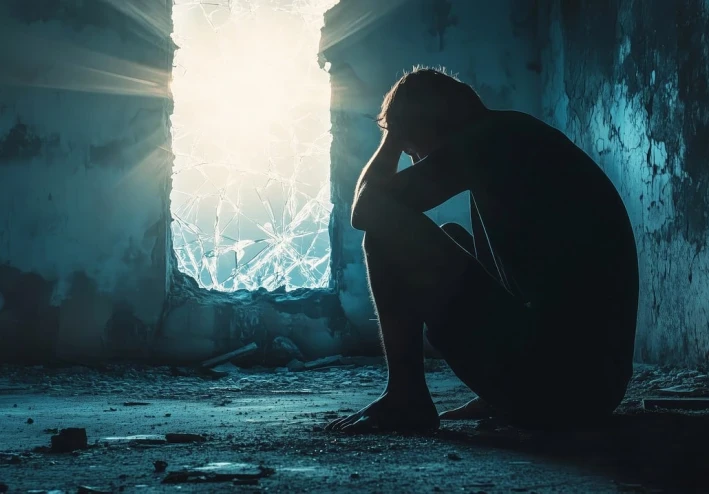
Suicide: A Fall Beyond the Walls of Meaning
Suicide: A Fall Beyond the Walls of Meaning
Man is a being pulled between two opposing forces: one that urges him to live, dwelling within him as the instinct of survival; and another that drags him toward nothingness, embodied in moments of utter collapse.
Modern psychological theories, along with existential philosophy, affirm that suicidal behavior does not erupt suddenly. Rather, it is the cumulative outcome of a fractured relationship between the individual and his own self, and between the individual and the world, when he fails to find a bearable meaning or a support that lifts him from the depths of his despair.
The Life Instinct and the Shadows of Death
Since the dawn of humanity, man has been inherently self-loving, instinctively avoiding harm. This drive for self-preservation is deeply rooted in human nature and journey. He only departs from it in two situations: either a voluntary transcendence for a principle he sacrifices himself for, or an existential collapse that pushes him to escape life through the door of death.
The instinct to live is powerful. It defends body and soul and feeds us hope for tomorrow. But in a certain moment—due to a reason or a series of reasons—this instinct may dim, and from within emerges a dark force lying dormant in the shadows: the death instinct, the driver of suicidal behavior buried deep within the human psyche.
A suicidal person does not truly seek death as much as he has lost the ability to live. He sees himself trapped in a dark tunnel with no way out. In his narrowed awareness, suicide becomes the only escape. Life has grown unbearably heavy, and death seems the easiest exit—as he believes.
Suicide in the Arab World
In several Arab societies, the phenomenon of suicide is on the rise, especially in environments devastated by war and burdened with ongoing crises. War leaves a trail of destruction that reaches all aspects of life, shaking moral frameworks and ethical values. This breakdown paves the way for rising suicide rates, especially among those aged 18 to 45—the age group most vulnerable to psychological fragility under such circumstances.
Many overlook what leads a person to commit suicide and instead invoke only its religious prohibition and the torment that awaits. Yet, some of these very people may unknowingly be one of the causes behind the victim’s fall. In times of crisis, people display a false sense of superiority, comparing themselves to the one who "failed to withstand the pain of life."
Approaching suicide only through religious fatwas is insufficient. The ruling is known and undisputed. What we must do is examine the underlying factors, interrogate the surrounding contexts, and understand the pathways that led a person to choose death. We need to explore the internal chaos—the suffering and emptiness—that no one saw. The goal is not to justify suicide, but to understand it as a final symptom of a long, neglected tragedy.
The Religious Perspective and Beyond
There is no dispute that suicide is forbidden in all divine religions. Its consequences go beyond the self, leaving deep scars in the hearts of loved ones and shaking the social fabric. Islam strongly forbids suicide to protect the soul, preserve human dignity, and prevent despair from becoming contagious. The soul is not our property—it is a trust placed in our care.
But knowing the religious ruling alone is not always enough to deter a person. Many who took their lives knew this ruling, yet they fell in a moment when their world collapsed, and all their supports vanished.
We live in fragile and painful times. Not everyone has the same resilience or clarity about life. Those who place excessive hope in life are often crushed the hardest when disappointed. To recall the Quranic verse “Indeed, we created man in hardship” and the saying of the Prophet ﷺ “A person is tested according to the strength of his faith”—with a present and living heart—is a powerful shield against the sin of suicide.
But such reflection requires proper spiritual upbringing, mental resilience, and understanding of this life’s nature: it is a place of passage, not permanence. Why end a life in a world we are merely entrusted with?
Our Social Responsibility
We must care for those going through psychological breakdown, harsh conditions, or emotional exploitation. We must try to understand them, support them, and help pull them out of the abyss of despair. We must watch for signs of suicidal ideation—depression, withdrawal from enjoyable activities, anger, anxiety, shame, low self-worth, erratic mood swings, persistent complaints about life, and frequent talk of death.
Any explicit mention of suicide should be taken seriously. It is a dangerous misconception that those who talk about taking their own lives are only seeking attention. Psychiatrists stress that verbalizing or planning suicide is a clear red flag that should never be ignored.
A Final Note
Suicide is not just tragic—it is heartbreaking. It reflects not cowardice, but a vast inner void that finds no exit but annihilation. It becomes even more devastating when the person leaves behind a note that reads: “I told you I would take my life... but you wouldn’t listen.”
So, listen—before the body hangs and the soul departs, and we mourn the pain of absence. Perhaps, if we had listened at the right moment, there might have been room for life, an escape from pain, and a refuge for the soul.
In conclusion, suicide is not merely an escape from life, but a cry for help unheard—a catastrophic decision born from despair and loneliness, not from weakness or ignorance of religious rulings.
If the Sharia forbids suicide, it also obligates us to guard the soul from destruction, to pull the despairing back from the edge, and to meet their fall with open hearts—not with judgment.
Because those who find no one to save them in life may turn to death with their own hands. And the first step toward change is to see them—before they vanish. Listen to their pain—before it’s written by a coffin in a graveyard. These souls are the mirror of our society, and their suffering reflects a collective failure in all of us.
Let us listen—perhaps that very act could become life itself. Perhaps a word can build a bridge that pulls a soul from the brink... and toward salvation.






































